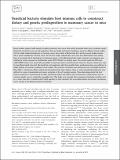| dc.contributor.author | Lakritz, Jessica | |
| dc.contributor.author | Poutahidis, Theofilos | |
| dc.contributor.author | Levkovich, Tatiana | |
| dc.contributor.author | Chatzigiagkos, Antonis | |
| dc.contributor.author | Mirabal, Sheyla | |
| dc.contributor.author | Alm, Eric J. | |
| dc.contributor.author | Erdman, Susan E. | |
| dc.contributor.author | Varian, Bernard | |
| dc.contributor.author | Ibrahim, Yassin | |
| dc.date.accessioned | 2015-04-09T19:54:31Z | |
| dc.date.available | 2015-04-09T19:54:31Z | |
| dc.date.issued | 2014-01 | |
| dc.date.submitted | 2013-07 | |
| dc.identifier.issn | 00207136 | |
| dc.identifier.issn | 1097-0215 | |
| dc.identifier.uri | http://hdl.handle.net/1721.1/96512 | |
| dc.description.abstract | Recent studies suggest health benefits including protection from cancer after eating fermented foods such as probiotic yogurt, though the mechanisms are not well understood. Here we tested mechanistic hypotheses using two different animal models: the first model studied development of mammary cancer when eating a Westernized diet, and the second studied animals with a genetic predilection to breast cancer. For the first model, outbred Swiss mice were fed a Westernized chow putting them at increased risk for development of mammary tumors. In this Westernized diet model, mammary carcinogenesis was inhibited by routine exposure to Lactobacillus reuteri ATCC-PTA-6475 in drinking water. The second model was FVB strain erbB2 (HER2) mutant mice, genetically susceptible to mammary tumors mimicking breast cancers in humans, being fed a regular (non-Westernized) chow diet. We found that oral supplement with these purified lactic acid bacteria alone was sufficient to inhibit features of mammary neoplasia in both models. The protective mechanism was determined to be microbially-triggered CD4+CD25+ lymphocytes. When isolated and transplanted into other subjects, these L. reuteri-stimulated lymphocytes were sufficient to convey transplantable anti-cancer protection in the cell recipient animals. These data demonstrate that host immune responses to environmental microbes significantly impact and inhibit cancer progression in distal tissues such as mammary glands, even in genetically susceptible mice. This leads us to conclude that consuming fermentative microbes such as L. reuteri may offer a tractable public health approach to help counteract the accumulated dietary and genetic carcinogenic events integral in the Westernized diet and lifestyle. | en_US |
| dc.description.sponsorship | National Institutes of Health (U.S.) (Grant P30-ES002109) | en_US |
| dc.description.sponsorship | National Institutes of Health (U.S.) (Grant RO1CA108854) | en_US |
| dc.description.sponsorship | National Institutes of Health (U.S.) (Grant U01 CA164337) | en_US |
| dc.language.iso | en_US | |
| dc.publisher | Wiley Blackwell | en_US |
| dc.relation.isversionof | http://dx.doi.org/10.1002/ijc.28702 | en_US |
| dc.rights | Creative Commons Attribution-NonCommercial | en_US |
| dc.rights.uri | http://creativecommons.org/licenses/by-nc/3.0/ | en_US |
| dc.source | Wiley Blackwell | en_US |
| dc.title | Beneficial bacteria stimulate host immune cells to counteract dietary and genetic predisposition to mammary cancer in mice | en_US |
| dc.type | Article | en_US |
| dc.identifier.citation | Lakritz, Jessica R., Theofilos Poutahidis, Tatiana Levkovich, Bernard J. Varian, Yassin M. Ibrahim, Antonis Chatzigiagkos, Sheyla Mirabal, Eric J. Alm, and Susan E. Erdman. “Beneficial Bacteria Stimulate Host Immune Cells to Counteract Dietary and Genetic Predisposition to Mammary Cancer in Mice.” Int. J. Cancer 135, no. 3 (January 10, 2014): 529–540. | en_US |
| dc.contributor.department | Massachusetts Institute of Technology. Department of Biological Engineering | en_US |
| dc.contributor.department | Massachusetts Institute of Technology. Division of Comparative Medicine | en_US |
| dc.contributor.mitauthor | Varian, Bernard | en_US |
| dc.contributor.mitauthor | Lakritz, Jessica | en_US |
| dc.contributor.mitauthor | Poutahidis, Theofilos | en_US |
| dc.contributor.mitauthor | Levkovich, Tatiana | en_US |
| dc.contributor.mitauthor | Ibrahim, Yassin | en_US |
| dc.contributor.mitauthor | Mirabal, Sheyla | en_US |
| dc.contributor.mitauthor | Alm, Eric J. | en_US |
| dc.contributor.mitauthor | Erdman, Susan E. | en_US |
| dc.relation.journal | International Journal of Cancer | en_US |
| dc.eprint.version | Final published version | en_US |
| dc.type.uri | http://purl.org/eprint/type/JournalArticle | en_US |
| eprint.status | http://purl.org/eprint/status/PeerReviewed | en_US |
| dspace.orderedauthors | Lakritz, Jessica R.; Poutahidis, Theofilos; Levkovich, Tatiana; Varian, Bernard J.; Ibrahim, Yassin M.; Chatzigiagkos, Antonis; Mirabal, Sheyla; Alm, Eric J.; Erdman, Susan E. | en_US |
| dc.identifier.orcid | https://orcid.org/0000-0001-8294-9364 | |
| mit.license | PUBLISHER_CC | en_US |
| mit.metadata.status | Complete | |
